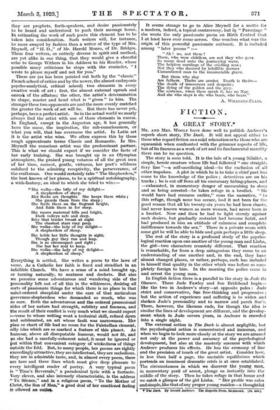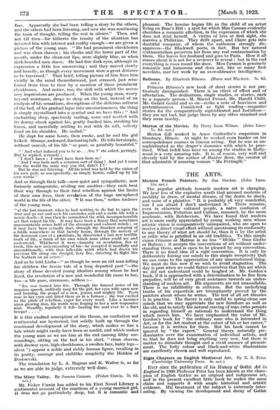FICTION.
A GREAT STORY.* Ma. AND Bias. Woor-r have done well to publish Andreev's superb short story, The Dark. It will not appeal either to those who regard fiction as a mild relimation or to those who are squeamish when confronted with the grimmer aspects of life, but of its fineness as a work of art and its fundamental morality there can be no question.
The story is soon told. It is the tale of it young Nihilist, a simple, heroic creature whose life had followed " one straight, fiery line "—a self-sacrificing ideal—to the exclusion of all other impulses. A plot in which he is to take a chief part has come to the knowledge of the police ; detectives are on his tracks ; he is cut off from all his customary hiding-places, and —exhausted, in momentary danger of succumbing to sleep and so being arrested—he takes refuge in a brothel. " He would have had recourse earlier," runs the narrative, " to this refuge, though none too secure, had it not been for the good reason that all his twenty-six years he had been chaste, had never known women as mere women, had never been in a brothel. Now and then he had to fight sternly against such desires, but gradually restraint had become habit, and had produced in him an attitude of calmness and complete indifference towards the sex." There in a private room with some girl he will be able to hide and gain perhaps a little sleep.
The rest of the story is a profound study of the psycho- logical reaction upon oneanother of the young man and Liuba, the girl—two characters remotely different. That reaction is remarkable, for from a deep antagonism they come to an understanding of one another and, in the end, they have almost changed places, or rather, perhaps, each has included in himself that quality in the other which was before so com- pletely foreign to him. In the morning the police come in and arrest the young man.
In English fiction there is a parallel to the story in Jude the Obscure. There Jude Fawley and Sue Bridehead begin— like the two in Andreev's story—at opposite poles : Jude strict and conservative, Sue free-thinking and progressive ; but the action of experience and suffering is to widen and slacken Jude's personality and to narrow and parch Sue's. There, however, the likeness ends, for though the idea is similar the lines of development are different, and the develop- ment which in Jude covers years, in Andreev is crowded into a single night.
The external action in The Dark is almost negligible, but the psychological action is concentrated and immense, and when we begin to look more closely at the story we are amazed
not only at the power and accuracy of the psychological development, but also at the masterly sureness with which Andreev produces his effects. He has the economy of line and the precision of touch of the great artist. Consider how, in less than half a page, the unstable equilibrium which portends an imminent dramatic crisis is at once established.
The circumstances in which we discover the young man, in momentary peril of arrest, plunge us instantly into the middle of the story. Then he takes refuge in that house and we catch a glimpse of the girl Liuba. " Her profile was calm and simple, like that of any proper young maiden—a thoughtful
• The Dark. Br Leonid Andreev The liogarth Peeve. Richmond. 12s. ast.1
face. Apparently she had been telling a story to the others, and the others had been listening, and now she was continuing the train of thought, telling the rest in silence." Then, and not till then—for hitherto the tensity of the situation has invested him with interest and reality enough—we are given a picture of the young man. " He had prominent cheekbones and was clean shaven ; his cheeks and the lower part of the mouth, under the clean-cut lips, were slightly blue, as when dark-bearded men shave. He had fine dark eyes, although in expression a little too unswerving ; and they moved slowly and heavily, as though every movement were a great distance to be traversed." That brief, telling picture of him fixes him vividly in the mind thenceforward, just stressed, just rein- forced from time to time by a mention of those prominent cheekbones. And notice, too, the skill with which the neces- sary impressions are produced. When the young man, weary beyond resistance, drops to sleep on the bed, instead of an analysis of his sensations, descriptions of the delicious softness of the bed, of his gradual lapse into unconsciousness, the thing is simply crystallized into a symbol and we have this : " And enchanting sleep, spaciously smiling, came and nestled with its downy cheek against his, gently fondled him, stroking his knees, and mercifully settling to rest with its soft, velvety head on his shoulder. He smiled."
He slept for some hours, then awoke, and he and the girl talked. Strange, awkward, fluctuating talk. He tells her simply, without conceit, of his life " so pure, so painfully beautiful."
" And what induced you to be so . fine 1' she asked, jeeringly. But he replied, seriously : ' I don't know ; I must have been born so.'
And I was born such a common sort of thing ! And yet I came into the world the same way you did, didn't I i ' But he was not listening. All his mind was held by the vision of his own past, so unexpectedly, so simply heroic, called up by his own words."
And so through their talk—now quiet and sympathetic, now furiously antagonistic, reviling one another—they each beat their way through to their final rebellion against the limits of their own lives, their revelation of the huge unexplored world in the life of the other. !.• It was then," writes Andreev of the young man,
" at the last moment, when he had nothing to do but to open the door and go out and seek his comrades and end a noble life with a heroic death—it was then he committed the wild, incomprehensible act that ruined his life. It may have been a frenzy that sometimes unaccountably seizes hold of the strongest and calmest minds ; or it may have been actually that, through the drunken scraping of a fiddle somewhere in that bawdy house, through the sorcery of the downcast eyes of a prostitute, he discovered a last new terrible truth of life, a truth of his own which none other could see and understand. Whichever it were—insanity or revelation, lies or truth, this new understanding of his—he accepted it manfully and unconditionally, with that inflexible spirit which had drawn his previous life along one straight, fiery line, directing its flight like the feathers on an arrow."
And as he told Liuba--" as though he were an old man telling his children the heroic tale of a long departed past "—the story of those devoted young idealists among whom he had lived, the revelation of a new and wonderful life came to her, too—a life pure, strenuous, selfless :-
" Ice was turned into fire. Through the funeral notes of his requiem speech, suddenly rang for the girl, her eyes wide open now and burning, the gospel of a new, joyous and mighty life. Tears rose in her eyes and dried there as in a furnace ; she was excited to the pitch of rebellion, eager for every word. Like a hammer upon glowing iron, his words were forging in her a new responsive soul. Steadily, regularly it fell—beating the soul ever to a finer temper . . . ."
It is this exalted conception of the theme, an exaltation not sentimental nor hysterical, but solidly built up through the emotional development of the story, which makes so fine a tale which might easily have been so sordid, and which makes the young man as we see him at the end (among filthy sur- roundings, sitting on the bed in his shirt, " clean shaven, with drowsy eyes, high cheekbones, a swollen face, hairy legs— silent ") appear a noble and richly human figure, recalling in its purity, courage and childlike simplicity the Mishkin of Dostoevski.
The translation by L. A. Magnus and K. Walter is, so far
as we are able to judge, extremely well done.











































 Previous page
Previous page